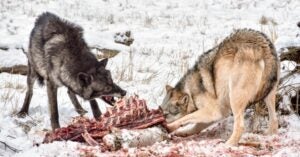Washington lawmakers have introduced a new bill allowing ranchers to shoot the first wolf that comes back to feed on killed livestock.
Senate Bill 5939 is co-sponsored by Republican state Sen. Keith Wagoner and Democratic state Sen. Kevin Van De Wege. The legislation allows for a three-year pilot initiative wherein individuals associated with the livestock, such as the owner, immediate family members, or specified employees, can monitor a site where a wolf has attacked the livestock.
If a wolf returns to the predation site, those authorized individuals can kill that specific wolf. However, it’s essential to report the incident to the Department of Fish and Wildlife within 24 hours and surrender the wolf carcass to the department.
This program intends to evaluate its effectiveness in mitigating wolf predation on livestock. The evaluation and findings will be presented to the legislature by December 1, 2027, allowing lawmakers to assess the program’s impact.
Wagoner and Woolley say that rather than indiscriminately killing a pack, these measures will increase the likelihood of killing the desired wolf.
“You may be killing a wolf completely innocent of anything, but that’s how it works right now,” Wagoner told Capital Press. “If we shoot the right wolf every time, we might actually see the depredations on livestock drop.”

However, not everyone agrees that the measure will be effective. Kettle Range Conservation Group‘s executive director, Tim Coleman, has argued that wolves hunt together in packs, so the first wolf to the kill may not have been the wolf that made the kill.
Currently, the Washington Department of Fish and Wildlife removes wolves in packs that depredate livestock by shooting the animals from a helicopter instead of singling out a particular pack member.
The bill also delineates degrees of unlawful taking of endangered fish or wildlife, specifying different penalties. There are distinctions between the second and first degree of unlawful taking based on prior convictions and the timeframe within which subsequent offenses occur. Penalties range from gross misdemeanors to class C felonies, with corresponding license revocation and hunting privileges suspension for offenders.
The legislation carries an expiration date of July 1, 2028. If it is not renewed or extended, the measures will cease.
The latest Washington Gray Wolf Conservation and Management Report reported that there were 216 wolves reported in the state in 2022. Packs range across public and private land in Ferry, Stevens, and Pend Oreille counties in the state’s northeast corner and Asotin, Garfield, Columbia, and Walla Walla counties in southeast Washington.
Increasing numbers were present in Okanogan, Chelan, and Kittitas counties in the north-central and central Washington region. Washington’s first pack to recolonize the south Cascades was documented this winter.
»Related: Colorado’s gray wolf reintroduction begins this month


